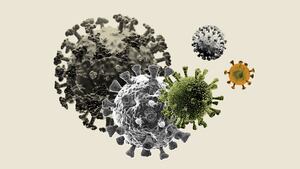We’ve gone a long way from the early days of the pandemic when folks were finding… um, unique ways to protect themselves from COVID exposure. Not only are N95 masks now widely available for purchase, but researchers have been hard at work developing even more sophisticated masks to guard against pathogens.
Scientists in China have created a new face mask that can tell if you’ve been exposed to respiratory viruses like the coronavirus or flu. In a paper published Monday in the journal Matter, the authors say that their mask can detect virus exposure after a 10 minute conversation with an infected individual. The kicker: It can also alert the wearer via an app on their phone.
This is obviously incredibly helpful for a number of reasons. For one, its wearer can isolate and test themselves once they’re aware of exposure—thereby preventing further spread. And it affords an extra layer of warning for anyone who is immunocompromised or lives with someone who is.
“[We] wanted to create a mask that can detect the presence of virus in the air and alert the wearer,” Yin Fang, a material scientist at Shanghai Tongji University and co-author of the study, said in a press release.
The mask relies on a highly-sensitive sensor embedded in the front of it. Once it contacts a virus-containing molecule like aerosols and liquids released from sneezing, coughing, or talking, it identifies the unique proteins of the pathogens and alerts the user on their mobile device.
It’s incredibly effective too. In tests, the study’s authors sprayed the mask with a trace amount of the viral protein. The sensor detected viruses roughly 70 to 560 times less than the amount of liquid created in a single sneeze. The amount was also far less than the amount produced by simply talking or coughing.
“Our mask would work really well in spaces with poor ventilation, such as elevators or enclosed rooms, where the risk of getting infected is high,” Fang said.
The team now hopes that they’ll be able to update their mask to detect new viruses that might arise in the future. Necessity is the mother of invention, after all. If there’s anything we’ve learned from the current pandemic, it’s that we were all caught flat footed by it. Hopefully, we’ll be able to face the next one in a smarter and safer way.







